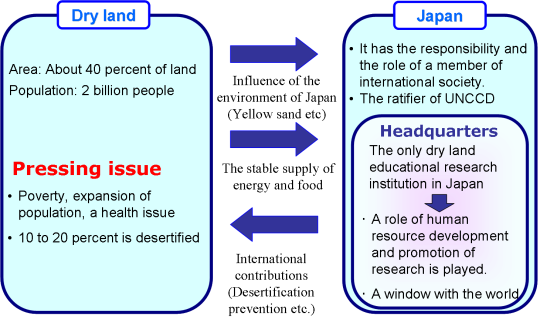Greeting

Hello everyone.
I am the base leader, Dr. Tsunekawa.
Although the problems of arid regions may at first seem distant to us, Japan is connected to them.
First, Japan has responsibility and a role as a member of the international community. As a country that has ratified the United Nations Convention to Combat Desertification, Japan is asked to contribute both scientific technology and human resource development to disaster stricken countries.
Second, Japan is influenced from an environmental perspective. Yellow sand is blown to Japan from arid regions, and its influence on people’s health, the ecosystem, and industry is causing concern. In order to reduce yellow sand, measures to prevent blowing sand in arid regions are effective.
Third, there is an effect on Japan from a social economic perspective. Japan and arid regions are connected through trade in energy resources and foodstuffs, and mutual exchanges of skilled people and culture.
We are attempting to contribute to the problem of arid regions through research and the cultivation of human resources. Our program covers the three topics below.
- The development of human resources that are accepted by the world.
- The promotion of research activities that meet the highest international standards.
- The formation of a worldwide academic network.
In particular, in order to support young scientists, we are creating an environment in which they can devote themselves to research without financial worry by creating a special framework. In addition, in hopes of helping young scientists to grow, we are preparing a wide variety of programs such as the support of overseas surveys and research and English training.
For the next five years, focusing on the Arid Land Research Center, we will do all we can to realize the “Global Center of Excellence for Dryland Science.” We ask for your support and cooperation.
The necessity for dry land science, and the role of a headquarters

